November 20, 2019 – We are delighted to welcome Janja Šestak to TCN, the first of our three new interns from the Faculty of Political Science & Journalism in Zagreb. A really great first piece on the Knight Order of St Nicholas Varaždin. And you thought Gen Z was lost all day in gadgets…
A new departure in the random TCN journey of life, as we start our first internship programme. Am very grateful to Janja, Ana and Paula for agreeing to join this experiment. I first met Janja after I gave a lecture at the university. She told me that she wanted to apply for the internship, but was not sure what she could write about, and she was worried that her English would not be good enough. I told her to relax, we discussed what her interests were.
And then she produced this!
Excellent start, young lady – more of the same please…
xxxx
Have you ever dreamt about stepping a few steps back in history? Have you ever dreamt of what was like to live in a castle? Dancing around the field with the knight and ladies? Crazy, isn’t it? And what if I tell you all of this is possible in the 21st century? Even crazier, right?
In the small, baroque city of Varaždin in northern Croatia, you can find real knights and real ladies from the Middle Ages. You must be wondering right now, how is this possible? Let me introduce you to the Knight Order of St Nicholas Varaždin. This reenactment group retells the stories from the past, covering the history of the 12th to the 15th century.
Croatia has its reenactment scene and plenty of groups that go back in time almost every weekend. Every weekend they appear in a different place depending on the story behind it. Today I will present you a group that is protecting the ramparts of Varaždin.
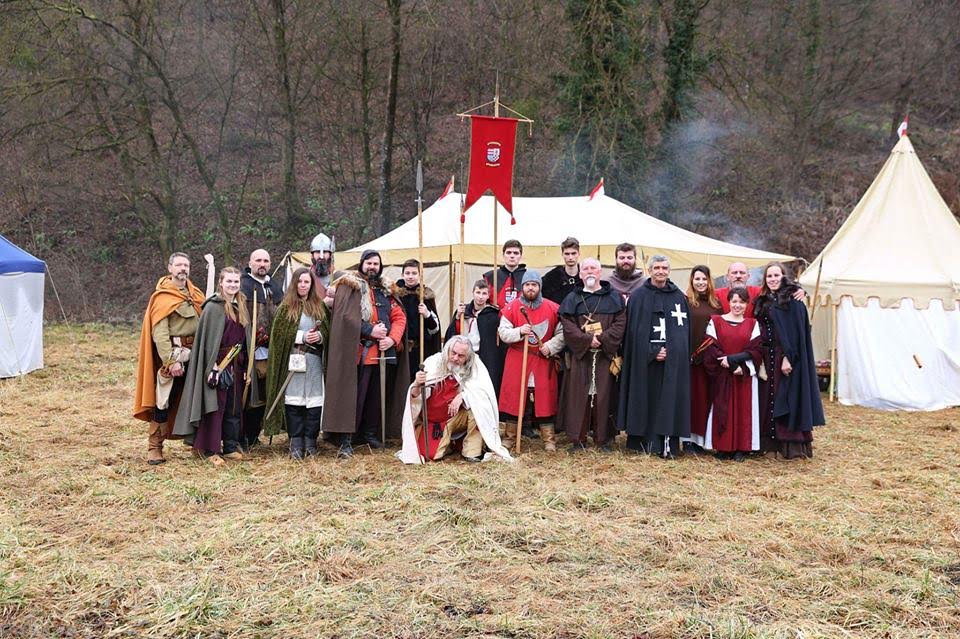
Escape the 21th century and come back with me to where the idea came from
The historical group was founded on 27 December 2011 by three archers, Radivoj Miladinović, Nenad Slukić, and Sanjin Rožić. They were in a sports club, but they wanted something different, something new. One of the first rules they agreed on was that the group would be unprofitable. “Money corrupts people”, they said. They wanted to be in a relaxed, friendly circle of people.
After they studied the history of Varaždin in detail – customs, traditions, clothing, even material for clothing – they started with some real things. They sewed their clothes in the exact form as it was, they made a couple of tents, wooden chairs and tables, agreed on a hierarchy in the group, and started gathering people. The first people to join were family members and friends. As the group was spreading, it gathered people with different talents and abilities. Some of them knew how to sew clothes, some of them were making jewelry, one woman knew calligraphy, a few of them were making swords, axes, chain-mail, shields, even authentic boots! If you notice, every person has some task in this group and it is something they are good at. When they go on tournaments, you know exactly who is in charge of what. And because of that, it’s much easier to maintain a group.
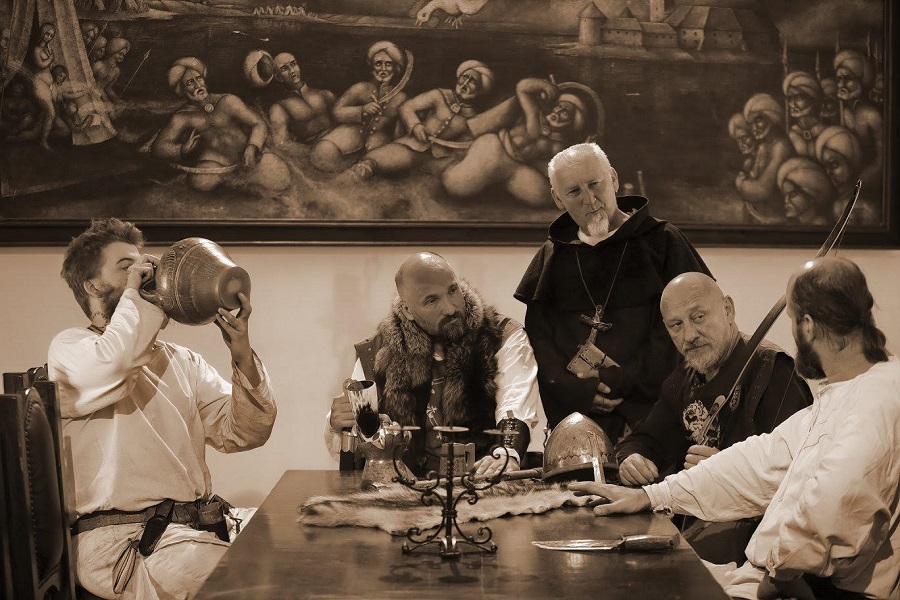
How do they dress?
Given that such clothing cannot be bought anywhere, they started making their clothes. They have learned from historical sources what material it should be, what patterns, how many layers of clothing, how citizens dressed, and how the nobility dressed. The women wore an underdress (smock) and houpelande, made of flax or raw cotton cloth. Depending on their stock, that is, their position in society, they enriched their clothes with various fur ornaments, the jewelry they made and belts around their waists. They would have a leather pouch called a gipser, which carryied the most essential items on their belt, just like men. Take the example of an ordinary citizen. His clothing consisted of pants made of flax or raw cotton cloth, with wool hose and leather shoes over them. The upper part of the body would be covered by a kirtle also made of the materials already mentioned, and a long tunic of wool or other warmer material would be put over it. During evening gatherings or cold nights, mantles were used, not with hoods as we see it in the movies, but those that looked more like a poncho. These are called paltocks. The hood was worn separately and was designed to cover the shoulders and part of the chest. It was made of wool because in previous times winter and evening were colder than they are now. Both men and women wore lightweight headgear throughout the day. A noble’s clothes differed by being more luxurious, with gold buttons, with more fur, more elegant, better quality. Flax was mainly used for underwear, pants, while the outer layers were made of wool. All members of the group adhere to these rules because what they are constantly striving for is authenticity.
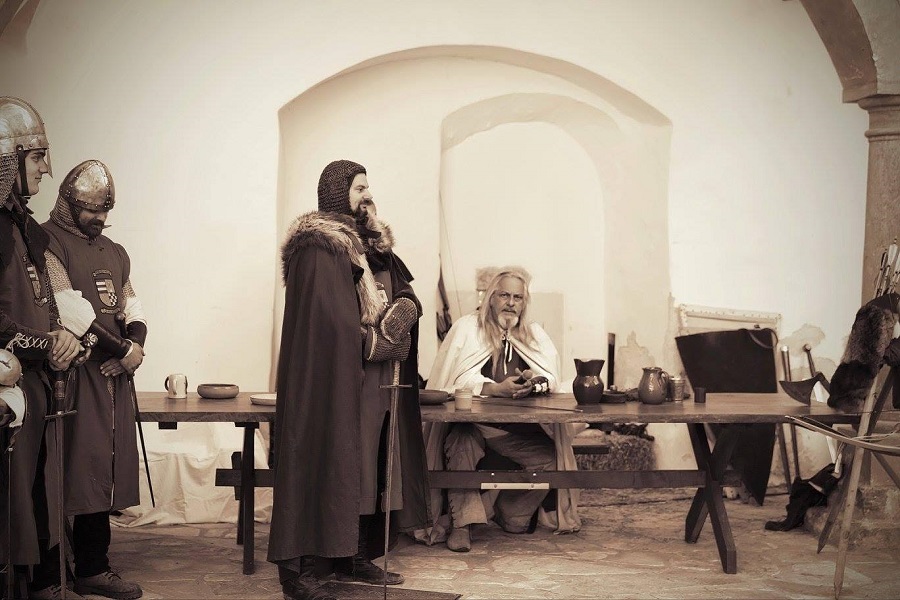
And what do they need to look like authentic warriors?
Each member of the association has a specific role in the Order and therefore owns certain equipment. Members who choose to be warriors with swords own a sword, a shield, a helmet, chain-mail that has tens of thousands of connected small iron rings, armour, shoulder protectors, arms, elbows, knees, shins. Likewise, every warrior owns a gambeson, a piece of equipment that resembles a modern coat, stuffed with multiple layers of fabric for colder days, and also to ensure that the metal armour does not go on the tunic alone. The gambeson, in addition to the coat, includes pants and a hat that goes under the helmet to prevent the helmet from damaging the head and to dampen any impact.
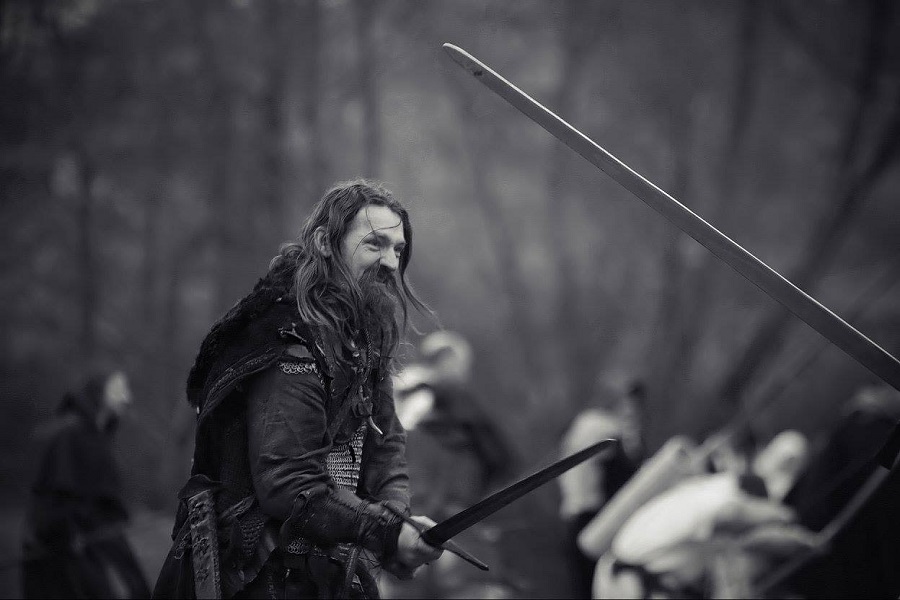
Depending on preferences, a member of the association chooses the weapon he or she wants; sword, ax, mace, knife, spear… Of course, all weapons are legally blunted and no injuries can occur. Archery warriors have their bow, arrows, bow, arm and finger protectors. They also wear helmets and headbands for protection. Archers were more readily equipped than knights who had full armour on them. The full armour worn by the knights weighs at least twenty pounds. For this reason, it is very difficult to move, fight or run. It is especially tiring when in such metal armour they have to stand in the sun or fight in the sun. But they do it all of their own free will, and they do not mind because they are already used to it.
You can check them out above on Lake Bled where they represented a military tactic called shield wall and archery training.
You might be wondering how their camp looks like
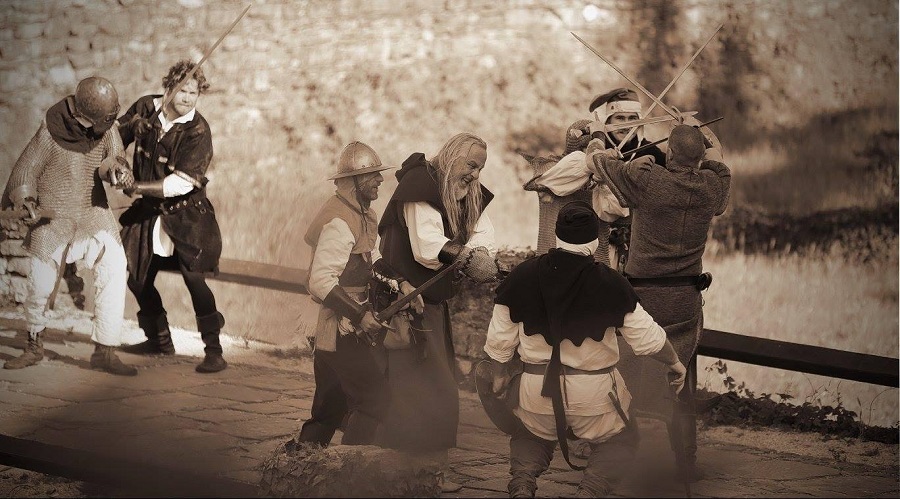
Furthermore, each knight’s association has its camp, which usually consists of an awning and two tents. This is the case with this Order, where one tent serves them as a kitchen. It contains all the food, drinks, a table where food is prepared, a wooden shelf containing plates and glasses, and a trash bag. The awning is only covered, but if the members sleep under the awning at night, “walls” can be added for a warmer and more comfortable atmosphere. By day, all members are under the awning, there are tables, benches, under the awning is lunch, etc. The third tent is for personal belongings; all the bags, the sleeping bags, everything that belongs to the modern world. Each knightly association makes sure that there is nothing modern on the tables or in a visible place. Many photographers and cameramen go through the camps, so, looking at what is in the camp, they prove their authenticity. The plates are wooden, the glasses are ceramic and wooden, the accessories are wooden or metal. In the evening, they set up torches in front of the camp, which they also made themselves, which creates the perfect atmosphere.
Who is in charge and how to become a knight?
At the head of the Knight Order of St. Nicholas Varaždin is the President, Grand Master Luka Borščak, Vice-President Alen Posavec, and Secretary Ivana Kovaček. The members of the Presidency are elected for a term of two years and re-election is possible. The Supervisory Board consists of Aleksandar Farkaš, Vlatko Lazić, and Ratko Ćosić. As the principal of the association, they arrange tournaments, the programme to be run, find transportation, take care of all the documentation, and generally the operation of the group.
When a person just joins the Order, they are first introduced to the rules, hierarchy, plans, actions. First, an application is signed on which to write their personal information, talents, or abilities and what he/she would like to be in that Order. After that, the search for clothing and sewing materials begins, aided by members of the Order who know more about it. When a person obtains appropriate clothing and footwear, he or she can participate in events. For the first year, he has the status of a squire. At the first meeting, the person is assigned his mentor, and the new person is his squire. This means that the mentor instructs the squire in the world of chivalry, the knight’s code, the work of the association, gives advice, and the squire assists the mentor in dressing military equipment, for example. For the first year, the squire is observing. The Order looks at his will, whether he has progressed in something in that year, looks at his behavior in the Order, whether he helps when the camp is building, or whether he helps other members. It is not some kind of surveillance, it simply pays a little more attention to the squire to decide after a year whether they are admitted to the Order or not.
If they prove to be worthy of joining the Order, men can claim the title of knight. The authorisation process can be done, at the request of the candidate, at an event or in a circle of association members. Most of them choose to be knighted at an event because it is a great honor and the audience has a rare opportunity to see the ceremonial process of authorisation. The ceremony is led by the Grand Master of the association, with the squire first standing in front of him, then kneeling on one knee. The Grand Master asks the candidate some of the following questions: Did you do a good deed? Did you save a lady in distress? Did you save your master? Did you learn archery, fencing and horse riding skills? Did you protect the weaker than yourself? Are you ready to defend women, the powerless and the master? Did you learn court dances? Are you ready at any moment, at the urging of your master, to defend your region, your people and your country?
This is followed by the sentence: “Now you will receive the last slap in your life that you cannot answer. Get ready.” After that comes the slap. Then the Grand Master pulls out his sword and says, “Get up Nicholas, Knight from the Raven’s Mount.”
Women, unfortunately, cannot become a knight because this is not historically accurate. Although the association is more indulgent than other associations in terms of women’s clothing, for example, becoming a female knight cannot be implemented. Therefore, this association devises a way for women to have their ceremony of becoming a lady.
Absolutely everyone has their responsibilities and there are no differences or highlights in this Order. Whether president or newcomer, everyone does the same. By work I mean loading things into a van, unloading, erecting a campsite, tent, and awning, assistance with the kitchen… According to the President, there is a friendly atmosphere, mutual support, openness in this Order. People like this association because it is what they are interested in, what they love, and that makes it easier immediately.
In the association, the members agree on what they want to do regardless of gender and stereotypical division into male and female jobs. Just as women are in the kitchen and sewing clothes, so are men cooking, making shoes, clothes, playing.
Check their Facebook page to stay in touch with their work.
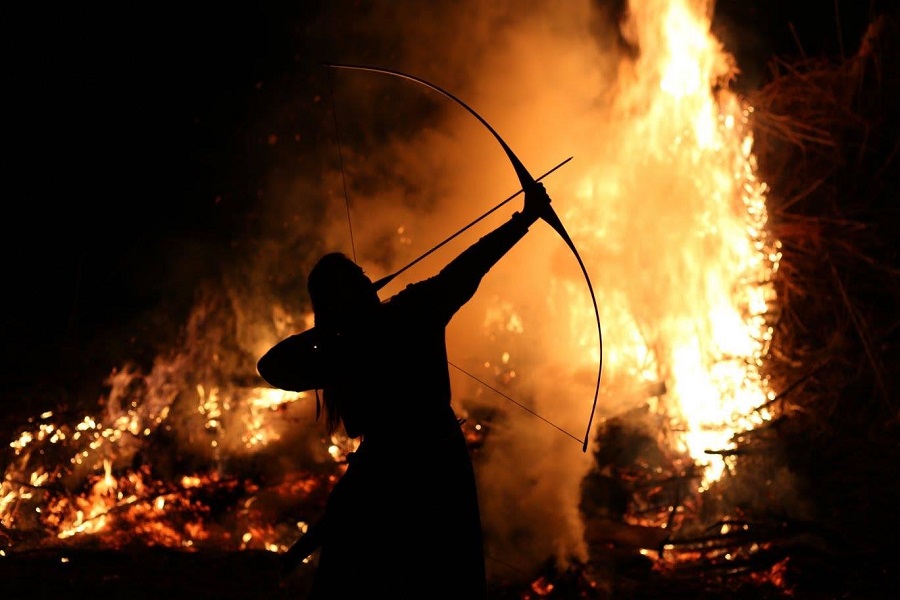
Why there is a battle in May in Varaždin?
The Knight Order of Saint Nikola Varaždin also has its tournament. The “Anđeoska strijela” tournament is traditionally held on the last weekend in May at the foot of the Old Town Castle in Varaždin. Each year, there is an increasing number of participants, a richer program and many visitors. In the morning, the associations arrive and set up their camps or camps. First, they make their way through the city, where all the associations, led by their flag, follow one another with the sounds of drums, flutes, songs. The tournament is officially opened by the mayor of the city, followed by an archery tournament where up to 50 competitors compete. Archers are shooting traditional wooden bows and wooden arrows at a distance of 20 meters. The archery tournament is followed by a solemn announcement of the winner, lunch, court dances, performances, demonstrations of military tactics, an archery workshop and even a brewery and production of local beer. At events like this, booth owners who sell their products are always present. So you can see blacksmiths, seamstresses, people who make jewelry and those who make little wooden swords and shields for the youngest. With the archery tournament, the most important thing is the Battle of the Granary of 1242. All associations take part in staging a historic battle relevant to the city of Varaždin. Before the battle, all members of the visiting associations who wish to participate in the battle come to the host camp to agree on a battle plan. Usually, the two warlords compete with each other, giving reasons why the other should relent and surrender. In this case, the knight of Varaždin Mihajlo defends the granary from the Tatars who burned and looted the surrounding villages. At the beginning of the battle, both warlords send three of their best knights to a duel of what is called God’s judgment. Everyone agrees that the army whose knights defeat enemy knights, that she is the victor and that there is no need for the further battle and bloodshed of hundreds of people. The duels are always played between two knights from the same association as they have rehearsed choreography and no injuries can occur. But whoever wins the duel, the undefeated side is never satisfied and decides to attack the rivals. The battle is played out according to a plan that the audience, of course, does not know, so everything looks very attractive and interesting. What is always taken care of is the safety of the audience and participants. The audience has a place where they can see everything and make sure that nothing happens to them. Battles always end with great applause and exclamations, taking pictures and smiles. Still, staging a historic battle is not something every day and people are delighted to see authentically trained people fighting for their city. They are especially surprised to see women in battle, whether fighting with the sword or as an archer.
https://www.youtube.com/watch?v=v3DCi_darYg
(Tournament “Anđeoska strijela”, 2017 in the video above)
How I got involved and what it’s like to be a woman dressed up like a man?
In my 2nd year of high school (Prva gimnazija Varaždin), there was a Medieval Week where we could learn about the Middle Ages in a different way than usual. I applied for a day when two knights came, actually members of the Knight Order of Saint Nicholas Varaždin. Honestly, I have never heard of them before, but this seemed interesting so, why not? These two were former Grand Master, Radivoj Miladinović and secretary of the association, Luka Borščak. They brought with them a lot of medieval weapons, such as swords, axes, shields, bows, and arrows. I had been interested in all of this since I was a kid. You know, when you grow up with one sister and two brothers, you enjoy making bows and arrows at home and enter the feeling of Lord of the Rings. So, I asked the Grand Master (his nickname is Pajo) if I could take the bow and pull the string. He was terrifically skeptical about that, but he let me. Once I pulled the string and did it pretty well, he looked at me pretty much speechless. “I have never seen someone do it so well, even some boys can’t do it like that!” I think in that exact moment, my interest in archery was born.
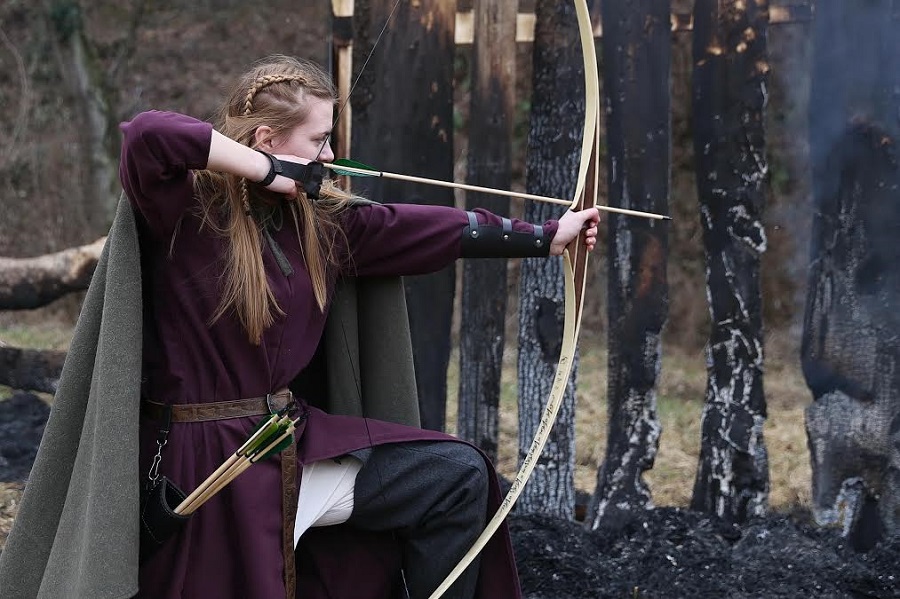
After that, I tried sword fighting with Pajo and enjoyed that throwback in history. He saw something in me and left me his business card. He told me: “Come to our meeting next Thursday and bring your parents with you. Since you’re under 18, you’ll need the permission of one of them.” This was funny to me, like, he already saw me as a member of his Order. Well, I came next Thursday with my mother, it was the 5th of May, 2016. I didn’t know what to expect, like, how many members there would be, the average age, who they even were. When we stepped into the yard, I was shocked. There were a couple of members and one of them was making a barbecue. A barbecue? Really? Like, okay people, I’m yours.
Joking aside, people were really nice to us, welcoming and friendly. Everything seemed to be awesome, till the moment I heard something about having to wear a dress. “But… Do I have to wear a dress? I’m not really into it… How will I move? Run? Fight in the battle?”
They looked at each other in confusion and finally said: “Okay, you can dress as a man, wear a tunic and hose.”
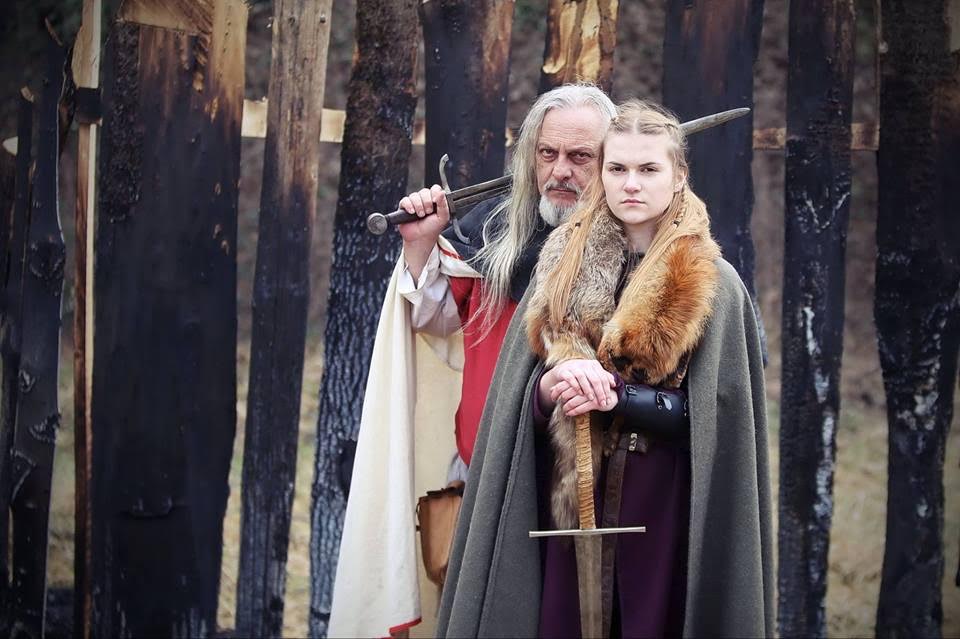
I believe I was the first woman to dress as a man in this Order. And I can tell you, sometimes I feel sorry for not wearing a light dress in those hot summer tournaments…
But nevermind, I got the status of the squire and through the next years, I was learning about the history of the Order, of Varaždin, etc. My role in the Order was an archer. They even bought me a bow and arrows! I enjoyed being in the battles and being part of the history group which nurtures chivalry, cavalierism, tradition, history, and friendship.
In addition to archery and swordsmanship, the Knights Order of St. Nicholas also performs staging, practices medieval military tactics, participates in various Medieval and renaissance festivals, organises workshops, etc. I met wonderful people, got chances that helped me in various ways, tried things I never have before and visited beautiful places. And believe me, it is not a cliché, I really enjoyed spending time in nature, sleeping under the stars and going into a night battle with fire on my arrowhead. Quite unique, isn’t it?
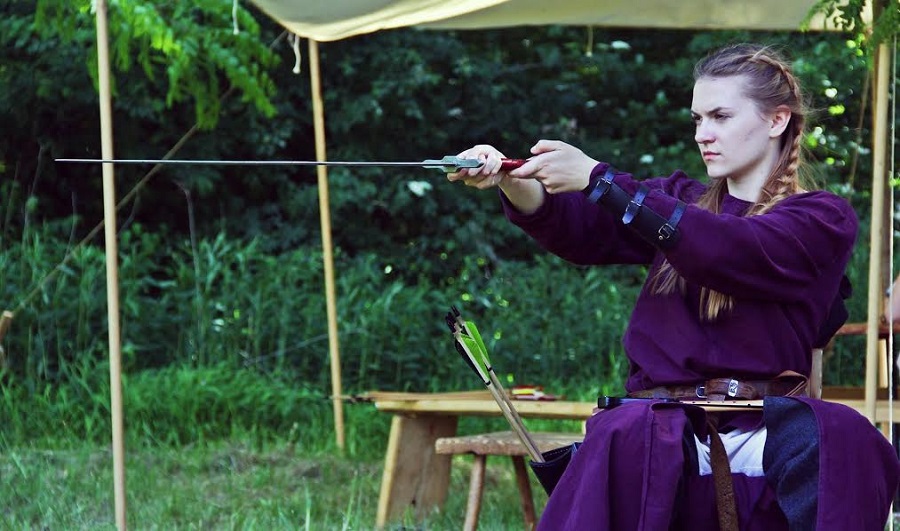
(The last photo is from Dimitrije Dimović.)









